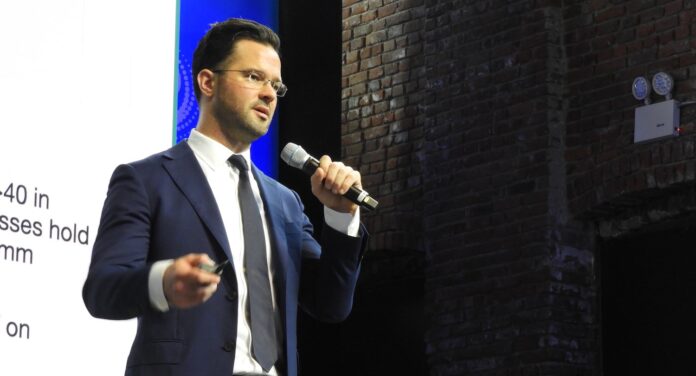- Travis Kling’s Ikigai rebounded from the FTX collapse by selling its $65 million bankruptcy claim and reinvesting for future growth.
- Kling remains optimistic about cryptocurrency’s future, focusing on Bitcoin ETFs and stronger risk management after Ikigai’s recovery from FTX losses.
In the fast-paced, high-stakes crypto world, Travis Kling is a person who has seen both incredible success and heartbreaking disappointments. Kling’s journey as the founder and Chief Investment Officer of Ikigai Asset Management has been one of conviction and bravery.
His shift from traditional finance to the digital asset industry displays not only his faith in blockchain technology, but also his fortitude in navigating crises that would have felled many.
Travis Kling: Transitioning from Traditional Finance to Blockchain Revolution
Travis Kling’s journey began in the more traditional realm of banking. As a hedge fund manager, he had built a good platform for investment methods. However, his enthusiasm for the promise of blockchain and cryptocurrency drove him to abandon the security of traditional finance.
Kling created Ikigai Asset Management in 2018, a firm focused on digital assets, at a period when the bitcoin market was still emerging but demonstrating disruptive potential. For Kling, the move signified a philosophical shift as well as a professional one: he believed that blockchain technology could positively upset the financial sector.
In those early days, Ikigai thrived by capitalizing on the growing interest in crypto investments. Kling’s in-depth knowledge of both traditional finance and the emergent digital asset class offered his firm an advantage.
However, the volatility of the cryptocurrency market, while presenting many opportunities for gain, also posed major hazards.
The FTX Collapse: A Fight for Survival
Kling’s optimism and daring approach were put to the test in 2022, when FTX, a prominent cryptocurrency exchange, collapsed, causing shockwaves throughout the sector. When Ikigai declared bankruptcy, a significant chunk of its funds—$65 million—were trapped in the exchange.
The unexpected downfall of FTX not only resulted in financial losses for Ikigai, but it also threatened the firm’s survival. The timing was particularly damaging because Kling had placed a significant wager on the exchange’s stability and expansion.
The collapse left Kling and his staff to face a difficult reality: the majority of their money was inaccessible, and the path to recovery was uncertain.
Throughout the trauma, Kling remained optimistic and resilient. He did not avoid the public eye, confronting the setback hard on and vowing to overcome the situation. Many in the crypto world admired his candour about the obstacles, as well as his drive to rebuild.
A Strategic Sale: Ikigai Path to Recovery
After nearly a year of dealing with the aftermath of FTX’s bankruptcy, Kling made a strategic decision that would be critical to Ikigai’s revival. The business sold its $65 million claim in the FTX bankruptcy for “much higher than expected.”
This transaction provided much-needed liquidity, allowing the firm’s stockholders to recoup their investments. While many questioned if Kling and his team could recover from such a devastating loss, this transaction enabled Ikigai to stabilize and even begin drawing fresh funding from existing investors.
For Kling, the transaction represented more than just recouping losses. It was a critical step in repositioning Ikigai for future growth.
In his own words, it was a matter of “opportunity cost”: rather than waiting for an unknown outcome in the FTX bankruptcy process, Kling elected to take the cash and reinvest it in more promising businesses. The decision was not without hazards, but it demonstrated the deliberate audacity that had defined his career since the beginning.
Looking Ahead: Rebuilding Confidence in Cryptocurrency
By early 2024, Kling’s attention had switched to the future, with a positive prognosis for both cryptocurrency and traditional markets. The acceptance of Bitcoin ETFs, as well as expectations of central bank rate reduction, boosted the broader financial markets. Kling expressed confidence that these factors will help ignite a new growth cycle for cryptocurrency.
Kling has underlined the necessity of learning from previous mistakes, especially in the aftermath of the FTX crash. In interviews, he has been open about the necessity for increased due diligence and the significance of not becoming “caught in something like FTX again.”
To that end, Ikigai has developed tougher risk management measures and is nonetheless cautious about where and how it invests resources in the volatile cryptocurrency ecosystem.
No spam, no lies, only insights. You can unsubscribe at any time.
Credit: Source link





















 Bitcoin
Bitcoin  Ethereum
Ethereum  Tether
Tether  Solana
Solana  XRP
XRP  Dogecoin
Dogecoin  USDC
USDC  Lido Staked Ether
Lido Staked Ether  Cardano
Cardano  TRON
TRON  Avalanche
Avalanche  Shiba Inu
Shiba Inu  Wrapped stETH
Wrapped stETH  Wrapped Bitcoin
Wrapped Bitcoin  Toncoin
Toncoin  Sui
Sui  WETH
WETH  Bitcoin Cash
Bitcoin Cash  Chainlink
Chainlink  Pepe
Pepe  Polkadot
Polkadot  LEO Token
LEO Token  Stellar
Stellar  NEAR Protocol
NEAR Protocol  Litecoin
Litecoin  Aptos
Aptos  Wrapped eETH
Wrapped eETH  Uniswap
Uniswap  USDS
USDS  Cronos
Cronos  Hedera
Hedera  Internet Computer
Internet Computer  Ethereum Classic
Ethereum Classic  Bonk
Bonk  Bittensor
Bittensor  Render
Render  Ethena USDe
Ethena USDe  POL (ex-MATIC)
POL (ex-MATIC)  WhiteBIT Coin
WhiteBIT Coin  Dai
Dai  MANTRA
MANTRA  Artificial Superintelligence Alliance
Artificial Superintelligence Alliance  Arbitrum
Arbitrum  dogwifhat
dogwifhat  Monero
Monero  Stacks
Stacks  Filecoin
Filecoin  OKB
OKB 
